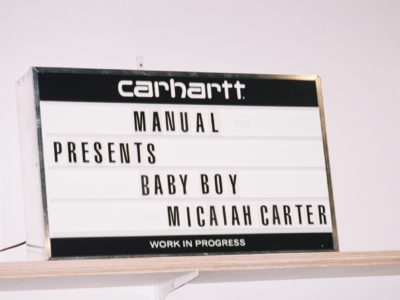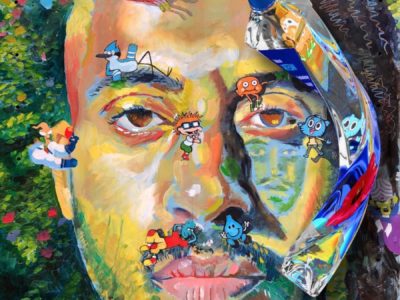Catching up with Irish Music Producer Krystal Klear
Catching up with Irish Music Producer Krystal Klear
PHOTOS : DEC LENNON
Born in Dublin, Ireland and now based in New York City, the music producer/dj Dec Lennon, AKA Krystal Klear also shoots photography — he’s got a new book of photos on the horizon — and runs his own record label, Cold Tonic, which puts out tracks for various artists. Amongst a chaotic schedule — the past year he’s been traveling constantly, spinning in more countries than he could easily count — Lennon took a seat with us to reflect on his career’s ascent and break down today’s djing and dance culture.
Tell me about yourself. Who are you and where are you from?
Declon Michael John Lennon, true story. I’m from Dublin, Ireland. Born and raised as pure as the Dublin-driven snow. Over the past 10 years I’ve lived predominantly in Manchester, New York City, and did a short stint in Los angeles … and London. I always forget about London. I’m a music producer and mostly known as a dj in the current time of the world.
Why is that?
Because dj culture overtook producer culture in around 2012 or 2013. The period leading up to that was the producer craze. Flying Lotus was in the press, and Hudson Mohawk. It was all a resurgence of people producing music in their bedrooms; those were the new buzz words. Then dance music took a huge turn again. At that point in time, people were listening to dubstep and going to clubs and getting lost in this ethereal experience. The vibe was very slow-paced for the most part. I always felt that when I went to club nights back then I couldn’t dance. I found it tough. It was an awkward phase in the early tenure of the music thing. Then finally in the UK and Europe things took a more high-energy turn and dance music surged in popularity again; it was on everyone’s doorstep. When a lot of people classify themselves as producers and they put X amount of time in the studios, they can be regarded as dj’s because a significant part of their visibility is seen through their gigs — videos of them playing their music.
Does that in a way make more sense for marketing yourself?
Not for me. I don’t necessarily like being referred to as a dj; I’m more so a producer. And I think of a producer as someone who is creative in a wide spectrum of ways. I do believe I’m a dj and there’s an art to being a dj. But I take most pride in my skill as someone who can make things.
There are so many dj’s that don’t make music!
There’s so many dj’s in general! I’m a confident guy and I do believe I’ve got a style and a way with music and playing records — I’ve been doing this since I was 15, before everyone was a dj. That’s not me with a weird chip in my shoulder saying it; it’s just a fact. When I was that age, my friends were also djing dance music just the way it is. And that’s great. I wouldn’t make such a living off of it, if it wasn’t popular. But djing is not brain surgery. There isn’t a tremendous amount of skill that goes toward what people can’t all learn. To define style in the world of djing requires a multitude of things that playing the records can’t exactly bring. Whereas a music producer is something more definitive.
Can you dig into that a bit?
Like if I was to play you a 10-minute mix from three records, you won’t necessarily know who’s spinning. But if I play you 10 minutes of music from my repertoire, you’ll be like, “Oh that’s Krystal Klear.” I think for me I take more pride as a producer first and foremost. I got into my career and passion producing things. And djing is just a byproduct of my passion.
Are you producing predominantly your own music or is it a balance with producing music for others?
It’s a mixture of both; it comes in waves. When the tide’s high, you have a lot of big labels contacting your management and saying, “Hey we’ve got so and so artist who’s releasing on blah blah label would Krystal Klear be interested in producing?” Stuff like that happens all the time, but I’ve been focusing on producing my own stuff recently and I’ve been so busy touring to really focus on others’ stuff. When I was younger, doing it all was no problem. But at some point, the product becomes weaker and watered down when you try to do too much at once. You’re not able to fully give the full attention and energy that everything needs. If I’m going to produce something for someone else, I have to give more respect because they’re trusting me to make something with their lyrics and emotions and how they feel. And that’s really important. So for my schedule now, I can’t immediately focus on it. But if everything happens within the next nine months that I’ve been discussing with my team, that position is likely to change dramatically and I will be writing for some people on projects that I am very excited about.
Haha so you can’t tell me now?
No, I’m sorry I can’t.
What are you focusing on right now? You’re living in New York?
I’m focusing on just keeping my head above water. I’m gigging and traveling a lot. I moved to New York when my schedule and lifestyle was a low — my career wasn’t going a million miles a minute — and on the back of a shitty breakup. But moving here helped and influenced what I’m doing now. Currently, it would make more sense and cost less if I were to live in London on Berlin. But the next four to five months, I’m focusing on touring and in my downtime, just taking it easy and looking after myself physically. The travelling is crazy and it doesn’t seem to be slowing down. That’s a great thing. It’s not something I’m necessarily complaining about. if I wasn’t travelling, I wouldn’t be putting a roof over my head.
Tell me about the travelling — where you’re going, and what the gigs are.
For the next three months, I’m playing everywhere from Berlin to Malta, Tokyo. Jesus where else? Some cities in France, Spain and Portugal. The way it works out, I tend to have between two to four shows, circumstantially international. Friday I can be in France, Saturday I can be in Spain and in Berlin by Monday. It doesn’t really leave me too much time to focus on my music or other interests, which is fine because I’ve just released a record.
Tell me about that record.
So I made a record, Euphoric Dreams. I wanted to make something for me, that sounded like a euphoric feeling that would make the hairs on the back of my neck stand up. It’s something I’ve tried to make for years and I’ve never fully succeeded at. And one day I was sitting in my bed and made this riff on my laptop and it just knocked me out. I was extremely excited. So I released that record last month. It’s doing very well and broke records on BBC Radio 1. I’m just happy to be releasing on my favorite label, Running Back Records in Germany. I had a big record last year called Neutron Dance, which also did really well. So I just want to keep things moving, as opposed to sitting in a position where you become stagnant.
How would you describe Cold Tonic?
It’s a record label and what I’d sort of describe as a drunken-photography outlet. Back in 2010-ish, I started taking 35mm photos. A friend of mine who’s a professional photographer, Josh Gordon, he told me I was missing an opportunity — that I should be capturing photos while I was doing graffiti and traveling for music. So he bought me a Yashica T4. Since then I’ve always taken photos on nights out, travels, events, etc. I guess that’s one element of Cold Tonic. The other element is releasing 12-inches, which are predominantly dance music. I’m releasing a record by Alex Olson in the next few months. I’d like to up the productivity of this within the next year. And also of course you and I spoke about releasing a book at some stage using my photos. The whole world is a photographer with Instagram, there are zines and books on every doorstep. With the photos I’m taking and the music I’m releasing, I want it to stand out the best I can. I want to present it to a world that’s respectfully saturated.
Of course. Do your best in everything. Innovate.
It’s cool because with music and photography — to use those two as an example — the accessibility in terms of someone can make a song on their laptop and on Soundcloud on the same day, and have 100,000 people listen to it by the end of the week, that’s incredible. Somebody can buy a point-and-shoot, take photos of their friends, print it and sell it at a book fair a week later, and have 100 people see their work. That’s incredible because it’s bringing a new age concept of ’80s new wavy art scene where everyone is uber creative because creativity was at their fingertips. Perhaps city landscapes, in terms of high rent, space and technology have decreased people’s productivity capabilities. If back in the ’80s, productivity was a result of having amazing spaces people can settle their drum kits, easels, photos and a mattress and by the end of the week, they’ve shot something or painted pieces, or a weird cassette recording of screaming into the mic. It’s difficult now to live in cities people want to live because of high rent and reduced spaces. With things like Instagram and the internet, people are again able to learn new and different ways of being productive. Because of technology, people now don’t need the space, or a darkroom to do the things they want to do. I don’t have a studio in New York, but I can just sit down and work at my desk in my apartment. It’s creating a surge of DIY-ism that in my opinion got lost in a period of time, about 10–15 years ago.






















